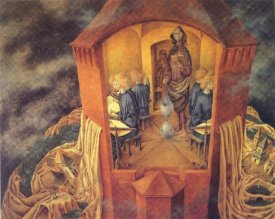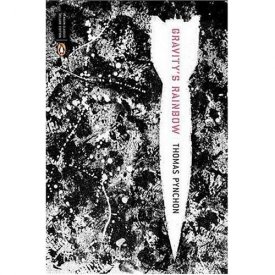Ell said:
Alright, I'm resurrecting this old thread as I've decided to take the plunge and try some Pynchon.
What's a good place to start? Should I begin with his collection of short stories, Slow Learner, work my way through his earlier novels (V, The Crying of Lot 49} or dive right into GR? Ms. Wilde, do you have any suggestions for this newbie?
ell
Here is my post on GR
http://forums.thebookforum.com/showthread.php?t=7594
And check out my thread on Kundera, where you may see the painting by Remedios Varos which is mentioned in Ch. 1 of
The Crying of Lot 49
(might as well repost excerpt)

In Mexico City, they somehow wandered into an exhibition of paintings by the beautiful Spanish exile Remedios Varo: in the central painting of a triptych, titled "Bordando el Manto Terrestre," were a number of frail girls with heart-shaped faces, huge eyes, spun-gold hair, prisoners in the top room of a circular tower, embroidering a kind of tapestry which spilled out the slit windows and into a void, seeking hopelessly to fill the void: for all the other buildings and creatures, all the waves, ships and forests of the earth were contained in this tapestry, and the tapestry was the world. Oedipa, perverse, had stood in front of the painting and cried. No one had noticed; she wore dark green bubble shades. For a moment she'd wondered if the seal around her sockets were tight enough to allow the tears simply to go on and fill up the entire lens space and never dry. She could carry the sadness of the moment with her that way forever, see the world refracted through those tears, those specific tears, as if indices as yet unfound varied in important ways from cry to cry. She had looked down at her feet and known, then, because of a painting, that what she stood on had only been woven together a couple thousand miles away in her own tower, was only by accident known as Mexico, and so Pierce had taken her away from nothing, there'd been no escape. What did she so desire escape from? Such a captive maiden, having plenty of time to think, soon realizes that her tower, its height and architecture, are like her ego only incidental: that what really keeps her where she is is magic, anonymous and malignant, visited on her from outside and for no reason at all. Having no apparatus except gut fear and female cunning to examine this formless magic, to understand how it works, how to measure its field strength, count its lines of force, she may fall back on superstition, or take up a useful hobby like embroidery, or go mad, or marry a disk jockey. If the tower is everywhere and the knight of deliverance no proof against its magic, what else?
--The Crying of Lot 49, end of Chapter 1
Here are other paintings by Varo:
http://www.angelfire.com/hiphop/diablo4u/remedios.html
This little passage is from "The Crying of Lot 49" by Thomas Pynchon.
But this little passage is an entire novel in itself. It is a nuclear explosion, a tsunami, a Krakatoa.
Allow me to do some wild, extemporaneous, expository conjecture, word by word, phrase by phrase:
"a number of" = the human race, all who have ever lived or shall ever live; the collective consciousness of the Zeitgeist.
"frail" = humanity in one word, frail, weak, ineffectual, self-destructive, sisysphean.
"girls" = humanity as feminine. God or the Universe is masculine. The final line of Goethe's Faust speaks of "the eternal feminine which draws us above," it is Beatrice which draws Dante upward.
"prisoners" = "the mind is its own beautiful prisoner" e.e. cummings
"top room" = upper chamber, the mystical supper
"tower" = tower of Babel, ivory tower, Borges "Library of Babel"
"embroidering" = Socrate's warp, woof, and shuttle of the dialectal process.
These frail young women are all faithful Penelopes, fending off the Philistine suitors, awaiting Odysseus return.
"which spilled out" = Rapunsel lets down her hair for her lover to ascend.
===================
Scenes and events from works and biographies become the vocabulary of my own private tapestry which I weave as reader and beholder of art. It is only through this private weaving, this creation of my inner world, that I make these things my own.
=============
This painting,
Embroidering Earth's Mantle, by Varo, combines two very ancient metaphors for the acquisition of knowledge and power: churning and weaving.
Notice the central figure who is reading a book and stirring a vessel.
There is an ancient Hindu myth about the churning of an ocean of milk in search for the nectar of immortality. There is a less ancient symbol of Socrates' weaver's loom, with warp, woof, and shuttle, as an image of the dialectic process. We are always weaving and churning. But, weaving and churning are two very different processes.





